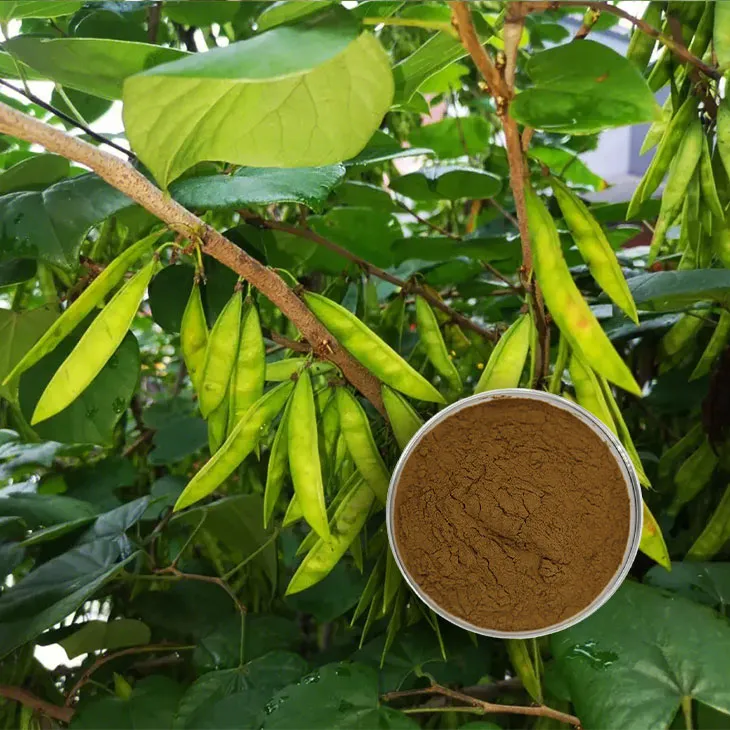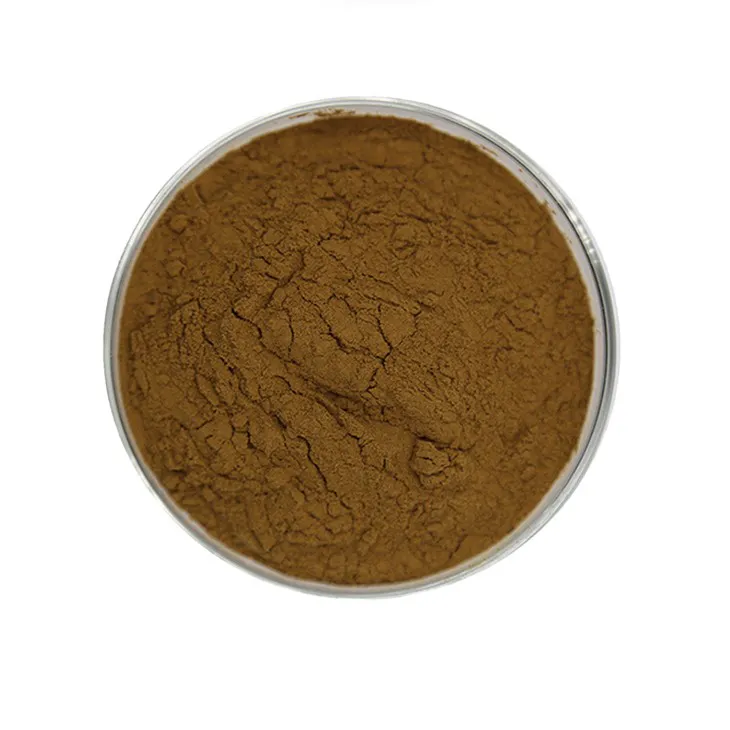- 0086-571-85302990
- sales@greenskybio.com
The Most Well - received Saponin Extract.
2024-12-02

Introduction to Saponin Extracts
The concept of The Most Highly - Rated Saponin Extracts is full of potential for exploration. Saponin Extracts are compounds with complex and fascinating characteristics.

Saponin Extracts in Plant - based Medicine
Saponaria officinalis, also known as soapwort, contains saponins that have been used traditionally for their expectorant and anti - inflammatory properties. These saponins can help in loosening mucus in the respiratory tract and reducing inflammation, making it useful for treating coughs and respiratory infections.
Traditional Uses
- In traditional medicine systems, saponin - containing plants have been used for centuries. For example, certain herbs with saponins were used to treat skin diseases. The saponins' surfactant - like properties were believed to help in cleansing the skin and reducing inflammation associated with skin disorders. - Another traditional use was in digestive health. Saponins were thought to aid in digestion by increasing the permeability of the intestinal wall, which could potentially enhance the absorption of nutrients. However, this also requires careful consideration as increased permeability could have negative implications if not properly regulated.
Modern Research in Plant - based Medicine
- Modern scientific research has delved deeper into the medicinal properties of saponin extracts. Studies have been carried out to determine the exact mechanisms by which saponins exert their anti - inflammatory effects. It has been found that saponins can modulate the immune response by interacting with immune cells and cytokines. - In the field of oncology, some saponin - containing plants are being investigated for their potential anti - cancer properties. For instance, certain saponins have been shown to induce apoptosis (programmed cell death) in cancer cells while leaving normal cells relatively unaffected. This selectivity is a key factor in the development of new cancer treatments.

Saponin Extracts in Biotechnology
When it comes to the biotechnological aspect, saponin extracts are of great interest. Scientists are exploring ways to use saponins as carriers in drug delivery systems. Their ability to form micelles can be harnessed to encapsulate drugs and target specific cells or tissues, improving the efficacy and reducing the side effects of drugs.
Drug Delivery Systems
- Saponin - based micelles can be designed to have specific sizes and surface properties. This allows them to penetrate biological membranes more easily and reach their target sites within the body. For example, in the treatment of brain diseases, saponin - modified drug carriers can potentially cross the blood - brain barrier, which is a major obstacle for many drugs. - The use of saponins in drug delivery also offers the advantage of controlled release. The micelles can be engineered to release the encapsulated drug at a specific rate, depending on the environmental conditions such as pH or the presence of certain enzymes. This can ensure a more sustained and effective treatment.
Biotechnological Applications Beyond Drug Delivery
- Saponins can also be used in biotechnological processes such as protein purification. Due to their ability to interact with proteins, they can be used to separate and purify specific proteins from complex mixtures. This is important in the production of biopharmaceuticals where high - purity proteins are required. - In gene therapy, saponins may play a role in enhancing the transfection efficiency of gene vectors. By interacting with the cell membrane and the gene - carrying vectors, saponins can help in the delivery of genes into cells more effectively.

Saponin Extracts in Environmental Protection
In the context of environmental protection, some saponin - rich plants can be used for soil remediation. The saponins can interact with heavy metals in the soil, facilitating their removal or immobilization. This provides a green solution for contaminated soil treatment.
Soil Remediation Mechanisms
- Saponins can chelate heavy metals in the soil. Chelation is a process where the saponin molecules bind to the metal ions, forming a complex. This complex can then be removed from the soil through various methods such as leaching or phytoextraction. - Another mechanism is the immobilization of heavy metals. Saponins can change the chemical form of the heavy metals in the soil, making them less mobile and less likely to be taken up by plants or leached into water sources. This helps in reducing the environmental risk associated with heavy metal - contaminated soil.
Potential for Phytoremediation
- Some saponin - rich plants can be used in phytoremediation projects. These plants can take up saponins from their roots and transport them to the soil, where the saponins can then interact with heavy metals. By growing these plants in contaminated areas, it is possible to gradually clean up the soil over time. - However, there are also challenges in using saponin - rich plants for phytoremediation. For example, the growth and survival of these plants in highly contaminated soils may be limited. Additionally, the disposal of the plants after they have accumulated heavy metals needs to be carefully managed to prevent secondary contamination.

Conclusion
Thus, the most highly - rated saponin extracts are not only important for human health and industry but also for environmental sustainability. Their diverse applications in plant - based medicine, biotechnology, and environmental protection highlight the significance of further research and development in this area. Future studies should focus on optimizing the extraction methods of saponin extracts, exploring new applications, and addressing the potential challenges associated with their use.
FAQ:
What are the traditional uses of saponin extracts?
For example, saponins from Saponaria officinalis have been traditionally used for their expectorant and anti - inflammatory properties. They can help in loosening mucus in the respiratory tract and reducing inflammation, which is useful for treating coughs and respiratory infections.
How can saponin extracts be used in biotechnological applications?
Scientists are exploring using saponins as carriers in drug delivery systems. Their ability to form micelles can be harnessed to encapsulate drugs and target specific cells or tissues, thus improving the efficacy and reducing the side effects of drugs.
What role do saponin extracts play in environmental protection?
Some saponin - rich plants can be used for soil remediation. The saponins can interact with heavy metals in the soil, facilitating their removal or immobilization, providing a green solution for contaminated soil treatment.
Why are saponin extracts important?
Saponin extracts are important for human health as they have traditional medicinal uses like treating respiratory problems. In industry, they can be used in biotechnological applications such as drug delivery. Also, they are important for environmental sustainability as they can be used in soil remediation.
What are the characteristics of saponin extracts?
Saponin extracts are compounds with complex characteristics. They have the ability to form micelles which is useful in drug delivery systems, and they also have properties like expectorant and anti - inflammatory in the context of traditional medicine.
Related literature
- Saponin Extracts: Properties and Potential Applications"
- "The Role of Saponins in Modern Biotechnology"
- "Saponin - Rich Plants for Environmental Remediation"
- ▶ Hesperidin
- ▶ citrus bioflavonoids
- ▶ plant extract
- ▶ lycopene
- ▶ Diosmin
- ▶ Grape seed extract
- ▶ Sea buckthorn Juice Powder
- ▶ Beetroot powder
- ▶ Hops Extract
- ▶ Artichoke Extract
- ▶ Reishi mushroom extract
- ▶ Astaxanthin
- ▶ Green Tea Extract
- ▶ Curcumin Extract
- ▶ Horse Chestnut Extract
- ▶ Other Problems
- ▶ Boswellia Serrata Extract
- ▶ Resveratrol Extract
- ▶ Marigold Extract
- ▶ Grape Leaf Extract
- ▶ blog3
- ▶ Aminolevulinic acid
- ▶ Cranberry Extract
- ▶ Red Yeast Rice
- ▶ Red Wine Extract
-
Withania Somnifera Extract
2024-12-02
-
Uridine-5'-monophosphate Disodium salt
2024-12-02
-
Tormentil Extract
2024-12-02
-
Clove Powder
2024-12-02
-
Europen Bilberry Extract
2024-12-02
-
Dandelion Leaf Extract
2024-12-02
-
Elderberry Extract
2024-12-02
-
Agaricus Blazei Extract
2024-12-02
-
Green Tea Extract
2024-12-02
-
Buckthorn bark extract
2024-12-02





















